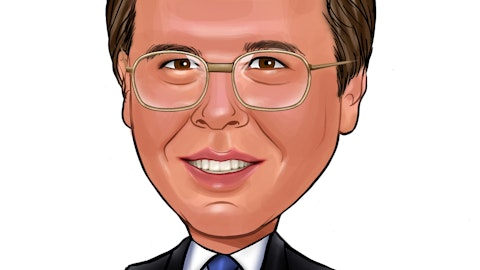Arty Straehla: Yes. They are directly related with our modifications to get our spreads to Tier 4 dual fuels. And they are primary parts that go for that conversion. So right now, we communicate with our customers, and we tell them exactly where we’re at, and that we’re working through solutions. I think they appreciated that we just didn’t take just a supply chain shortage and just pass it on, went to the factory and did a deep dive into it with our supplier and try to work through solutions. So we think that, that is a lot better than just sitting and waiting and listening to them telling that it’s going to be short. So can I predict when we’re going to receive everything that allows us to do it? I can’t do it yet, just the supply chain is too unknown at this point.
But I’m going to tell you that I got an update from the factory this afternoon that came in. And here’s what I got for three pieces of equipment, hold shipment, short insulation assembly, hold for a part availability, hold for part availability. So out of five key pieces of equipment come in, three of them are on hold in the factory, waiting for them to have parts. Now these same parts are used as replacement parts. So as you see some of the attrition that’s going on with not as many pressure pumping spreads out as other, attrition in this business is real. We run this equipment very hard. And having to have the parts to correct it is a major issue for the industry.
Carter Dunlap: If I could just follow on because I don’t think I’ve ever asked this question? On a new bid job, what is the difference for the rate of putting a dual fuel in a customer’s hands versus what’s there now, the single fuel?
Arty Straehla: Well, it’s more economical. It’s more €“ and it’s more efficient from an emission standpoint. So the entire industry is converting over to either dual fuel or in some cases, they are going through electrification of those spreads. But to really make a valid point about €“ this is a really long conversion process to go to this. Even in the Permian, where they are very set up to run dual fuel, only about half the spreads there are running dual fuel. The rest of them are running diesel. But it is more economical for the customer, and it is more efficient friendly. And we want to get converted as quickly as possible.
Carter Dunlap: Okay. I mean I realized it’s a table stakes investment, but it doesn’t sound like it’s a €“ I mean it’s either the non-dual fuels at some point won’t be marketable, but it’s not a question of being able to put the machine back out at a higher rate.
Arty Straehla: That’s correct.
Carter Dunlap: Okay, thank you.
Operator: At this time, there are no further questions. I would like to turn the call back over to management for closing comments.
Arty Straehla: Thank you, operator, and thank you again, everybody, for joining us on the call today. We maintain our belief that Mammoth is well positioned for continued growth and supported by experienced team members that are among the best in the business. This concludes our conference call, and we look forward to speaking to you again next quarter.
Operator: Thank you. This does conclude today’s teleconference. You may disconnect your lines at this time and thank you for your participation, and have a great day.
Follow Mammoth Energy Services Inc. (NASDAQ:TUSK)
Follow Mammoth Energy Services Inc. (NASDAQ:TUSK)
Receive real-time insider trading and news alerts

